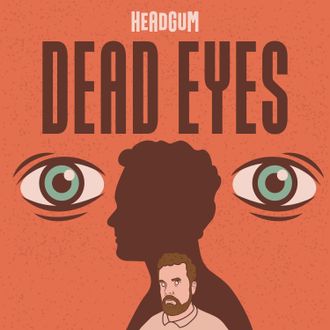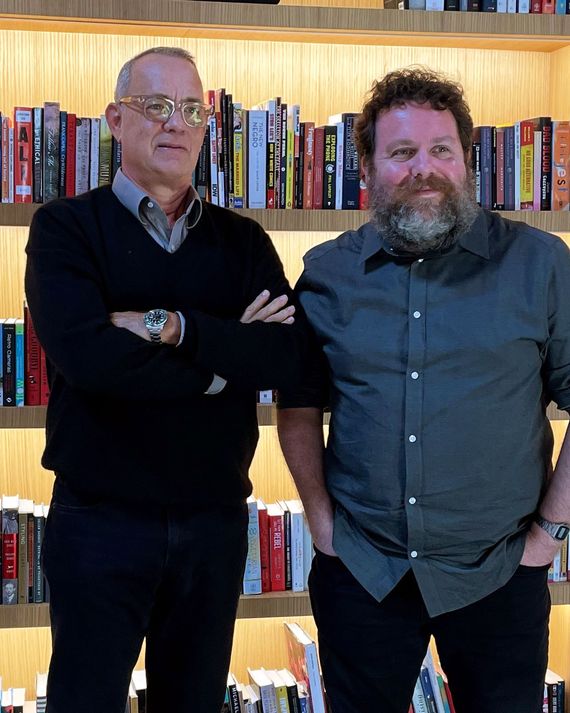
Sometimes, Ahab gets his whale.
This week, Connor Ratliff, the actor and comedian whose Dead Eyes podcast — now two years old and 30 episodes deep — is built on the premise of once being rejected by Tom Hanks in a manner that’s frankly pretty brutal, was finally joined by the man himself. If this is the first time you’re hearing about the show, it might come as a surprise when I say: The resulting conversation is one of the most delightful things you’ll listen to. The episode works remarkably well as a stand-alone piece, though divine satisfaction awaits those who have been following Ratliff’s odyssey in real time from the start.
But let’s back up. Once described by Ratliff as a “personal nonfiction investigation series,” Dead Eyes is an interview show where the guests are unified by a central biographical mystery. In 2000 Ratliff was cast on Band of Brothers, the critically acclaimed HBO miniseries. It was a tiny role: Private John S. Zielinski (a surname that carries dramatically different weight these days), who appears for all of two minutes in the entire series. But for Ratliff, then in his early 20s and cobbling together acting credits, all work is crucial work, especially a gig as high profile as this one.
Yet he never ended up appearing on the show. As the story goes, he was called back in to reaudition for Tom Hanks personally. Hanks was an executive producer on the series and the director of the episode Ratliff was supposed to be on; in what’s essentially a breach of protocol, he was told by his agent’s assistant that Hanks, the nicest man in show business and one of the biggest actors on the planet, thought he had “dead eyes.” Ratliff lost the part after that reaudition. It’s the kind of experience that can crush a budding soul, and at the time it marked the very bottom of Ratliff’s young career. The podcast, then, takes the form of Ratliff’s journey to reexamine the moment for some answers: Why exactly did he miss out on the part? And what does having “dead eyes” actually mean?
There are ways that Dead Eyes could have been … shall we say, saltier. If conceived by someone with more vengeful tendencies, or perhaps less therapy, we might’ve gotten a show that was more hard-edged in its ploy for attention. Such a project would have likely just been ignored, buried in the stormy seas of the podcast charts as an angry peculiarity. Ratliff is not such a person, and Dead Eyes was always a significantly more interesting project from the start. Though propelled forward by the memory of a harsh early-career experience, Ratliff carries the podcast with tongue firmly in cheek and a more soulful goal in mind. “I had the thought this would be a funny premise for a podcast, and when I started thinking about where it could go, I figured plenty of other people would have had similar or analogous experiences,” Ratliff told Vulture back in 2020. “It could be kind of interesting to explore show business from this very specific angle.”
And that he did. For 30 episodes, Ratliff produced a catalogue of conversations that collectively serves as an extended meditation on disappointment, heartbreak, failure, and the breaks of the game — not just in show business but also, not to sound too hokey, in life. The themes Dead Eyes persistently explores are rich and endless, and its tenor captures the feeling of navigating life’s greatest anxieties. You might take years to land that job, find that person, and build that life, or you might never even get the chance at all.
Ratliff’s Band of Brothers experience, now calcified into a foundational piece of his personal mythology, serves as a guiding framework for the whole enterprise, providing a layer of narrative context for each guest and conversation that turns out to be incredibly satisfying. Indeed, here’s an interview show where each episode genuinely feels like part of a discrete progression, as opposed to some random expression of the interviewer’s personal network and interests (as is the problem that plagues so many of the more hollow celebrity podcasts). Oddly enough, there’s a bit of The X-Files in the structure of Dead Eyes. You have clear “mythology” episodes, in which Ratliff tracks down key players in his Band of Brothers experience: his agent at the time; the actor who ended up booking the role of Private Zielinski; and even Aimee Mann, whose music inadvertently ended up being a sound he heavily associates with the event. Then you have episodes that feel less tethered to the core conceit, in which Ratliff chats with various show- business types — Damon Lindelof, who surely knows a thing or two about the vagaries of show business; Nikki Glaser; Seth Rogen — to talk about their experience with the rough work of trying to be a person in the entertainment business. It’s crucial to highlight that all these conversations are stitched together by blocks of Ratliff’s narration, which is really a showcase for his great writerly voice: interior, dry, intentionally preposterous in its quest to draw meaning from every bit of connection, utterly funny.
It was never a given that Ratliff would ever get his man, and for a long while, Dead Eyes seemed like a show that could have simply continued in perpetuity. This wouldn’t have been a bad thing, though perhaps the Tom Hanks–centric premise would’ve been stretched deeper into absurdism the longer the show goes. In any case, the point is now moot: This week, Hanks appeared on the podcast and Ratliff got his answers.
Well, sort of. The fact of the matter is that no answer, no matter the shape or depth, could ever be fully clarifying or satisfying, and the hope of our lives is to simply let such things be: This is the Lindelovian lesson. Of course, that doesn’t mean there’s no catharsis in finally getting what you’ve always wanted, and in Ratliff’s case, it’s the opportunity to directly be present and engaged with Hanks about everything that happened within his Band of Brothers experience and everything that’s happened to him after that provides long-sought release.
There are things to learn, surely. We learn, for example, that Hanks became aware of the podcast because of his children, Colin, who was a guest, and Elizabeth. (No Chet, though.) We learn the already well-known fact that Hanks is extremely charming, a quality that pierces through even as he expresses responsibility for purveying the cause of Ratliff’s early-career trauma. “This was all on me,” Hanks assured, his voice fatherly in its gravel. “Don’t for a minute think that someone else got in there.” We also learn that, perfectly understandably, Hanks doesn’t remember exactly why Ratliff lost out on the role. (Though, looking back at Ratliff’s headshot from the time, he disagrees with the dead eyes assessment.) “Honestly, I have no recollection, but I have very few recollections of any day in the course of directing that [episode] because it’s just such utter chaos,” said Hanks. He added: “But I’m trying to figure out what possible rationale I had for making a change in a role that only shot for one day. I’m flummoxed as to why I even bothered.”
There’s a compelling tension that has always stood out to me about Dead Eyes. On the one hand, the show evokes a fear I’ve long felt about moving through the world: What if something I said or did — whether directly or indirectly via a system I’m a part of — negatively affected someone else so deeply that it informs a formative part of their identity? On the other hand, a lot of what Ratliff does is come to terms with how the impact of larger structures and the people within them are simply out of our hands. What’s striking about Ratliff’s interview is how it foregrounds Hanks’s ability to hold onto personal empathy amid the industrial grind of the entertainment world. Was there anything Ratliff could have done differently? Probably not. “It’s that A Wonderful Life moment where you start thinking about what you did or didn’t do,” said Ratliff at one point in the episode. “Don’t pull those threads, man. It’s a delicate knit, the whole thing that got us from there to here,” Hanks responds.
It’s more or less the very same thing Marc Maron gleaned from his interview with Lorne Michaels. For years, there was an informal subplot lurking beneath WTF With Marc Maron that involved the comedian’s attempt to understand why he never made Saturday Night Live, a mystery that was finally resolved in 2015 when he successfully brought Michaels onto the show to extract some answers. The core lesson hums a familiar tune: What happened to you largely has less to do with you, and more with everything else. The work isn’t necessarily about letting things go, but knowing how to reincorporate them into the story of your life.
The episode is also, quite frankly, a stellar interview with Hanks, who tends to be somewhat opaque due to that famous niceness he’s known for. Not here: Ratliff engages Hanks with the full weight of his journey, thus pulling the man into a kind of collaborative processing of their shared experience of the entertainment world. Speaking with Ratliff, Hanks is drawn out not just as an interviewee, but as a peer looking back at his life, discerning its patterns, and hoping to communicate some wisdom to a younger person. As the listening bystander, we benefit tremendously.
So where does Dead Eyes go from here? Now that the show has resolved its driving mystery, to keep going would be to stay at the party for a little too long. If this is indeed the end, I’ll miss Ratliff’s voice and the glorious melancholia of his adventure. But in a podcast universe that’s filled with unsatisfying and inconclusive endings, here’s a rare show that gives you a perfect conclusion.



